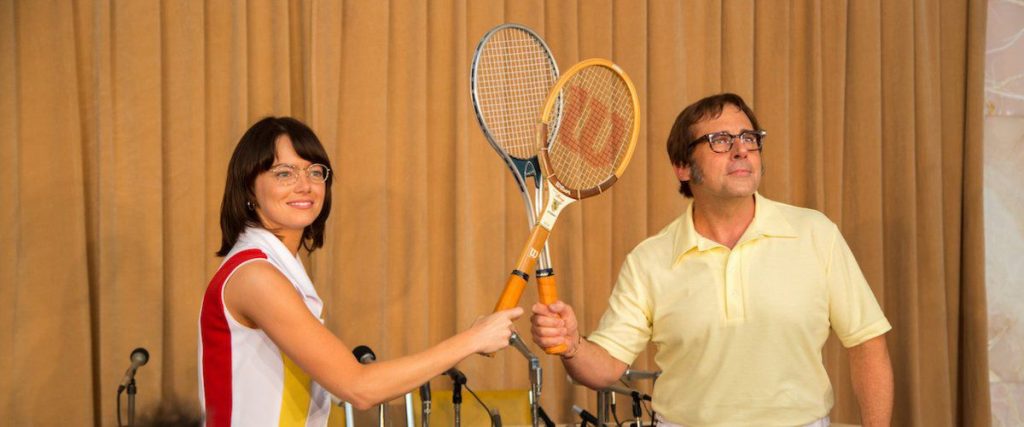Perhaps the most telling sign of a great sports movie based on historical events is when you enter the theater knowing the outcome, and yet, as you watch it unfold, you sit on proverbial pins and needles, anxiously wondering, “Wait … it did all work out in the end, right?” Following its recent nationwide release, I can comfortably place the film “Battle of the Sexes” — which depicts the monumental match between female tennis star Billie Jean King and former Wimbledon champion Bobby Riggs — into that unique category.
Despite the fact that the actual “Battle of the Sexes” was a relatively drama-free tennis match (King beat Riggs handily in straight sets), the film flourishes with drama thanks to co-directors Jonathan Dayton and Valerie Faris (“Little Miss Sunshine”) and screenwriter Simon Beaufoy (“Slumdog Millionaire”).
The proceedings begin with King (a stellar Emma Stone) incensed by National Tennis League President Jack Kramer’s (the ever-reliable Bill Pullman) stubborn insistence that the league’s male players deserve more pay that its female counterparts. King bravely rallies her female contemporaries and launches the Women’s Tennis Association. During a press tour arranged by the female players’ delightfully snappy publicist (Sarah Silverman), King meets hairdresser Marilyn Barnett (Andrea Riseborough), whom she invites to join the tour under the closeted guise of being merely a close friend.
The story cuts back and forth between King and Riggs (Steve Carell, at the top of his game), an accomplished player from the previous generation of tennis greats whose glory days are long gone but whose insatiable gambling addiction has followed him into retirement. We’re also introduced to Riggs’ country club friends, who enable his gambling addiction, and to his self-made affluent wife (Elizabeth Shue) and his adult son from a previous marriage, both of whom can’t help but love Bobby, but who also can’t stand to be disappointed by him again.
Seeking to boost both his adrenaline and his ego, Riggs proposes a nationally televised “Battle of the Sexes” to King, who initially declines. King has a change of heart, however, after Margaret Court — who had recently defeated King to become the world’s No. 1 ranked women’s tennis player — accepts Riggs’ offer and is decimated by him in an event that would become infamously known as the “Mother’s Day Massacre.” And as King witnesses Riggs’ showboating and chauvinism on television, she comes to view beating Riggs as a responsibility.
Much like a long rally in tennis, “Battle of the Sexes” sees Stone and Carell, from a performance standpoint, proverbially knock the ball back and forth into the other’s court, both stealing every scene as the action cuts between King to Riggs.
Stone delivers a great performance, doubling down on the fascinating dichotomy of King’s ferocious competitiveness and staunch advocacy for equal rights for women, belying her insecurities about herself and her sexual identity.
Carell, meanwhile, brings his signature sense of humor to the film in all the ways you’ve come to expect from him. But he also pulls off the near-impossible task of making the loudmouth, sexist Riggs a sympathetic character. When the ultimate match arrives, we feel the weight of the world on King’s shoulders, but we also, oddly, feel a little nervous for Riggs, a true testament to the film’s sharp writing and direction.
Besides being an enjoyable sports movie, “Battle of the Sexes” (which is rated PG-13) also succeeds in its loftier goal of holding a mirror up to American society, and the film works brilliantly as a gender study. Hearing the male characters in the film utter sentiments about women being inferior to men feels markedly antiquated, but, at the same time, feels like it’s permeating throughout our current cultural mind-set as much as ever before. Therefore, “Battle of the Sexes” serves not only as a triumphant celebration of King’s invaluable impact on women’s rights, but also as a sobering reminder that her fight is far from over.

